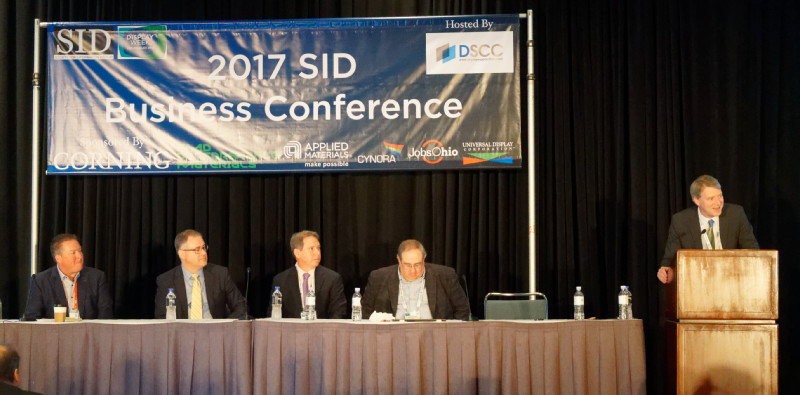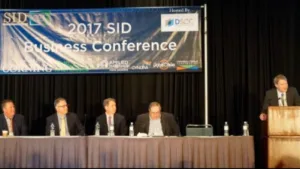At the end of the session, there was a panel discussion and the panel was joined by Chris Larson, who is a SVP of TCL North America. He was asked about quantum dots and why it is important. He said that the US market is so price sensitive that he doesn’t currently sell TVs using QDs in this market, although they are being sold in the other parts of the world. The company loves what QDs can do, but TCL is ‘not staking its future on it’.
O’Brien asked about building a fab for LCDs in the US. Another panellist was Ted Griffiths, who is Managing Director of IT & Logistics for Jobs Ohio and he said that business is often about being close to the customer. Autonomous cars could become “huge smartphones on wheels” and he thinks that there could be opportunities for displays to support this. He said that Ohio is about the size of the economy of Switzerland and the state is within one day’s drive of 60% of the US population and 70% of the US automotive industry. The state is number one in plastics and in glass and is a big supplier to Airbus and Boeing.
 From left to right – Larson (TCL), Ellison (Corning), Griffith (Ohio), Baker (NPD), O’Brien (DSCC). Image:Meko
From left to right – Larson (TCL), Ellison (Corning), Griffith (Ohio), Baker (NPD), O’Brien (DSCC). Image:Meko
OLED company, UDC, has a manufacturing plant in Ohio. Penn State is an important university with a long history in LCD technology. These factors could make a US fab in the region more likely to succeed.
O’Brien asked if Amazon is having a big impact on retail in the US. Baker of NPD said that Amazon has been in electronics for a long time, so it’s presence is not a new factor. US retailers are starting to work better in understanding how to use the combination of their online and store presences. It’s hard to communicate image quality online and image quality is important to TV buyers. Retailers are also good at selling accessories to TV buyers for audio, for example and that can raise margins and overall revenue more than selling online.
In response to a question, Ellison of Corning said that LeEco is still selling Iris-based TVs despite its financial difficulties. He said that LeEco has a business model that, more or less, sells at cost in order to sell add-ons and services. That can make the business model challenging. There are lots of other companies that are using the Iris glass. It has taken some time for Corning to understand how to join the value chain for TVs, but it is now working well.

